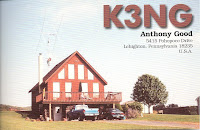 Over-The-Air QSLing
Over-The-Air QSLing
A few days ago I received another one of those email requests to update one of my online QSL logbooks. I receive these periodically and they're somewhat annoying, though I should probably just delete my online logs. I've found online QSLing to be just more of a PITA than it's worth, especially Logbook of the World (LOTW). As I've mentioned in previous blog articles, I think LOTW is over-engineered. I know ARRL designed it the way they did in order to minimize forged QSLs, but it's still horribly easily to forge paper cards or game the QSL manager system to get cards for QSOs that never occurred. Perhaps some folks who chase awards need to wrap some sort of security or authentication around the whole QSLing process in an attempt to give it more prestige or relevance, but to me it's rather pointless in the grand scheme of things.
I love the KISS approach VA7VV has created, where you can just go to his site and print out a QSL card. I intend to take a similar approach soon, though not as "self-serve" as VA7VV has done, but migrating to a PDF format where I'll just email a QSL card to anyone who requests one.
But I was thinking the other day, why not just do over-the-air QSLing? With public/private key encryption it's easy to take some text or data and create a key that can be used to authenticate the information back to the originator. There could be a program or website to generate keys on the fly. I'm wondering if a key could be shaved down to maybe 10 alphanumeric characters that could be exchanged over the air like: "Here ya go Bob, here's yer QSL key: Gulf Delta Charlie One Foxtrot Zed Five Nine Yankee Three.... Good DX and 73!" You record that in your log and if someone wants to authenticate it back to the station, they can grab his public key off of the 'zed or at ARRL and plug it into the program or a website. I'm not sure how many bits the encryption would have to be decreased to to make the QSL key exchanged over the air short enough or make the encryption a reasonable enough level to prevent most forgeries.
Ah....maybe it's more trouble than it's worth and I should stick with emailing QSLs...
Anthony Good, K3NG, is a regular contributor to AmateurRadio.com and writes from Pennsylvania, USA. Contact him at anthony.good@gmail.com.I love the KISS approach VA7VV has created, where you can just go to his site and print out a QSL card. I intend to take a similar approach soon, though not as "self-serve" as VA7VV has done, but migrating to a PDF format where I'll just email a QSL card to anyone who requests one.
But I was thinking the other day, why not just do over-the-air QSLing? With public/private key encryption it's easy to take some text or data and create a key that can be used to authenticate the information back to the originator. There could be a program or website to generate keys on the fly. I'm wondering if a key could be shaved down to maybe 10 alphanumeric characters that could be exchanged over the air like: "Here ya go Bob, here's yer QSL key: Gulf Delta Charlie One Foxtrot Zed Five Nine Yankee Three.... Good DX and 73!" You record that in your log and if someone wants to authenticate it back to the station, they can grab his public key off of the 'zed or at ARRL and plug it into the program or a website. I'm not sure how many bits the encryption would have to be decreased to to make the QSL key exchanged over the air short enough or make the encryption a reasonable enough level to prevent most forgeries.
Ah....maybe it's more trouble than it's worth and I should stick with emailing QSLs...














